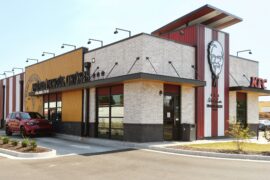Maple Leaf Foods has suspended operations at its poultry processing plant in Brampton, Ontario, Canada after three workers contracted the novel coronavirus (SARS-Cov-2). The Mississauga-headquartered company is thoroughly sanitizing the facility while the cases are being further investigated.
“Our goal is to complete the investigation and the deep-cleaning as quickly as reasonably possible. We will not begin operating again until we are confident that it is safe to return to work,” CEO Michael McCain said in a statement.
Maple Leaf Foods reported an additional Covid-19 case involving an employee at its plant in Hamilton, but the worker had not been present at the facility for two weeks prior to the diagnosis.
The facility has been thoroughly sanitized and remains fully operational.
“This is truly an unprecedented period for our company and the entire food industry,” McCain said. “We take our responsibility to feed people seriously every day of the year. You have my personal assurance that we stand with our 13,000 team members and with our customers in getting through this difficult crisis.”
Cargill Closes Meat Plant in United States
Meanwhile, Minnetonka, Minnesota-headquartered Cargill announced on April 7 that its meat packing facility in Hazleton, Pennsylvania has been closed until future notice. The plant specializes in producing ground beef, steaks, beef roasts and pork products distributed to supermarkets and other retail grocery stores.
“The goal is to keep our 900 employees at this case-ready protein facility healthy and minimize risk within the Hazleton community, which has been greatly impacted by Covid-19. The facility will re-open as soon as is it is safe to do so,” announced a statement issued by the company.
Disruptions in the international food conglomerate’s supply chains have been limited thus far, according to the a notice at the company’s website, which further elaborated on the coronavirus challenge as follows:
“We are prioritizing our employees’ health and well-being, as they are essential in delivering the food we all need to stay healthy and nourished. This includes additional precautions to support staff at our production facilities, including temperature testing, cleaning and sanitizing procedures, prohibiting visitors from entering our facilities, prohibiting international travel, limiting domestic travel, adopting social distancing practices and offering shift flexibility to keep our major production facilities open.”






